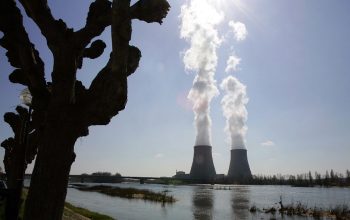
A Ukrainian hospital damaged in a Russian missile attack has been turned into a clean-energy model for the future of the country’s infrastructure, even as the war in the country rages on.
The destruction of the small hospital in Horenka, a village on the outskirts of Kyiv, happened in the first month of the Russian invasion. Shelling from a missile strike hit the hospital grounds, leaving the building’s windows shattered, its exterior damaged, and an erosion of the electricity supply.
The aftermath turned the hospital that once catered to a population of 10,000-12,000 patients from four different villages into an example of the brutalities of Vladimir Putin’s war and left it with a €56,000 repair bill for heating reconstruction.
“I, with another doctor, was at the hospital. We were trying to treat people and give vaccinations,” Doctor Olena Opanasenko, who works at the hospital, told Euronews. “It was 25 February 2022 when the electricity of the hospital was disconnected, and it wasn’t reconnected until May,” she said.
Horenka’s hospital is one of an estimated 330 that had been destroyed across the country by the end of December 2022, according to a report by the Kyiv School of Economics. In total, the country has suffered infrastructure damages of at least €129 billion.
Debates surrounding how Ukraine will be able to rebuild after the war have led some to suggest that the task will require fast-paced designs that bypass aims to meet the country’s pre-war Paris Climate Agreement goals of cutting CO2 emissions by 65 percent by 2030.
‘Hospitals are one of the most important infrastructure’
But some local and environmental NGOs — Greenpeace Central and Eastern Europe (CEE), Eco Action, Eco Club, and Victory of Ukraine — set out to prove the hospital can be rebuilt fast to meet the needs of the local population but also in such a way that it remains resilient against future attacks and create a clean-energy grid that lowered consumption costs.
“It’s very difficult for people to receive this medical aid elsewhere in the area as many hospitals were damaged in the area. Hospitals are one of the most important infrastructure that needs to be rebuilt already now while people are coming back as in the case of Horenka,” Greenpeace CEE Campaigner Denys Tsutsaiev told Euronews.
“Reconstructing fast might mean that you do not use the best technology, that you do not do the best analysis for the needs of the people of the region. This is not something that supports the future resilience of the people of Ukraine,” he added.

On-the-ground work on the hospital began last fall as Ukraine’s heating season was rapidly approaching, and as Russian was pounding the country with constant missile strikes.
“There were very often power outages. We decided that if we would install the solar power system, which will have battery storage, this hospital could continue working without interruption for the whole time,” Tsutsaiev said.
With each further attack, problems arose, delays came when there were electricity cuts, which forced the project to stop, and they had to wait for two months for equipment for the solar system to be transported to the hospital.
But clean-energy infrastructure was eventually installed in the building, such as a heating pump — which takes heat from the ground or air around a building and increases it to a temperature that will keep the hospital warm inside — and a hybrid solar power system that uses solar panels to produce energy during the day for use when there is no sunlight.
This led to an 80 percent reduction in heating costs and fewer CO2 emissions, one of the leading contributors to climate change, according to Tsutsaiev.
“Before war, I was interested in saving the environment,” Sergiy Regeda, a volunteer with Victory of Ukraine, said. “I watched different documentaries, learning more about this, about recycling, about clean energy. And now, I have direct access to it.”
“Now we can see firsthand how this works, how we can actually implement this in our municipality. So that’s what we’re doing,” he added.
Other municipalities
The need for the Horenka Hospital is observed each day, with about 50 and 60 patients visiting doctors, getting vaccines, and having checkups and gynecological exams. A station is also set up in a separate room where Doctors Without Borders helps survivors of Russian traumas recover from their injuries.
With its clean energy grid, the hospital is also prepared for any future attacks.
The solar power system “covers pretty much 100 percent the needs of the hospital during the daytime, and if there is a power cut during the night, there is a battery which pretty much can hold it over into the night, so the critical infrastructure of the hospital still operates, the fridges and emergency lights,” Tsutsaiev said.
But although using clean energy has its benefits, it also has drawbacks such as potential equipment failure and difficulty in sourcing replacement if needed due to shortages on the market and the need to import all the equipment from abroad, Tsutaiev said.
However, Greenpeace has taught the hospital staff how to navigate any possible disturbances, including how to monitor the solar power station, tackle problems as they occur, monitor the energy consumption and change their behaviour to lower consumption if it is too high.
Now, the NGO hopes to replicate the accomplishment in other areas of Ukraine. “We are actively promoting the example of the hospital to other municipalities so they can include such ideas into their reconstruction plan and replicate this project too.”
“We’re trying to get them [staff] more familiar with the systems. And of course, we know this is kind of like a role model for others.”
An aspect agreed upon by both Greenpeace and Victory for Ukraine is that rebuilding Ukraine fast is not a sustainable option, both for the environment and for future generations living in a free Ukraine.
“If we talk about the restoration of industries, enterprises, social infrastructure, the most important thing is that the restoration must be provided according to new, modern, economical, energy-efficient, and ecological world standards,” Regeda said.
“I am sure that our plans will be successful. It is also very important to restore people’s destroyed homes, because millions of Ukrainians have lost their houses and flats. I am sure that after our victory, all people will return to their homes, and those who lost them will get new, even better ones,” he added.

